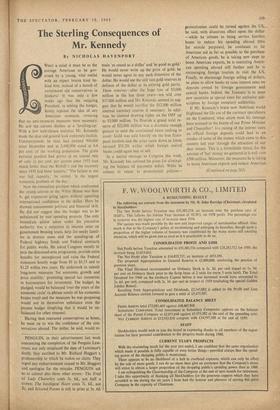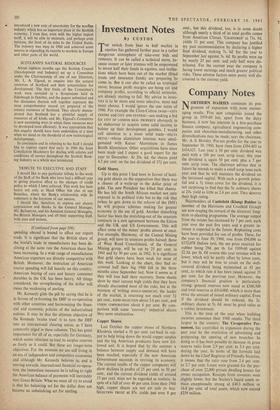The Sterling Consequences of Mr. Kennedy
By NICHOLAS DAVENPORT WHAT a relief it must be to the average American to be gov- erned by a young, vital realist with an expert brains trust be- hind him, instead of a bunch of complacent old conservatives in blinkers! It was only a few weeks ago that the outgoing President, in tabling the budget, firmly rejected the idea of any American recession, swearing that no anti-recession measures were necessary. He saw the current decline as a 'levelling-up.' With a few well-chosen statistics Mr. Kennedy made the dear old general look extremely foolish. Unemployment, he said, had jumped 900,000 since December and at 5,400,000 stood at 6.6 per cent. of the working population. The gross national product had grown at an annual rate of only 21 per cent. per annum since 1953 (not much better than the British!) and the recovery since 1958 had been 'anaemic.' The failure to use our full capacity,' he added. 'is the urgent economic problem of the day.'
Now the immediate problem which confronted the young activist in the White House was how tc. get expansion going again without upsetting international confidence in the dollar. Here he showed consummate political and financial skill. He did not suggest that the budget was to be unbalanced by vast spending projects. The only immediate action taken under his executive authority was a reduction in interest rates on government !rousing loans, help for needy famil- ies in distress areas and the speeding-up of Federal highway funds and Federal contracts for public works. He asked Congress merely to pass the distressed-area programme, provide extra benefits for unemployed and raise the Federal minimum hourly wage from $1 to $1.15 and to $1.25 within two years. He undertook to submit long-term measures 'for economic growth and price stability,' promising special tax incentives to businessmen for investment. The budget, he pledged, would be balanced 'over the years of the economic cycle' (a phrase surely of his economic brains trust) and the measures he was proposing would not in themselves unbalance even the present budget (implying that it would be un- balanced for other reasons).
Having thus reassured conservatives at home, he went on to win the confidence of the con- servatives abroad. The dollar, he said, would re- PENGUIN, in their advertisement last week announcing the completion of the Penguin Law- rence, not only misplaced the date of Lawrence's death; they ascribed to Mr. Richard Hoggart a Professorship to which he makes no claim. They regret any embarrassment caused to Mr. Hoggart and apologise for the mistake. PENGUIN ask us to correct also three other errors: The Trial of Lady Chatterley costs 3s. 6d., not half a crown; The Intelligent Heart costs 7s. 6d., not Ss; and Selected Poems is still in print at 3s. 6d. main 'as sound as a dollar' and 'as good as gold.' He would never write up the price of gold; he would never agree to any such distortion of the dollar. He would use the still vast gold reserves in defence of the dollar at its existing gold parity. These reserves—after the huge loss of $5,000 million in the last three years—are 'still over $17,000 million and Mr. Kennedy seemed to sug- gest that he would sacrifice the $12,000 million internal currency reserve if necessary. In addi- tion, he claimed drawing rights on the IMF up to $5,000 million. To flourish a grand total re- serve of $22,000 million was a dramatic enough gesture to send the continental bears rushing to cover. Gold was sold heavily on the free Euro- pean markets and the price came down to limits (around $35.20) within which foreign central banks could again buy or sell.
In a special message to Congress this week, Mr. Kennedy has outlined his plans for eliminat- ing the balance of payments deficit. While he refuses to resort to protectionist policies— protectionism could be turned against the US, he said, with disastrous effect upon the dollar —while he refuses to bring service families home to reduce his spending abroad (this for morale purposes), he continues to tic American aid as far as possible to the purchase of American goods, he is taking new steps to boost American exports, he is restricting Ameri- can spending abroad still further and he is encouraging foreign tourists to visit the US. Finally, to discourage foreign selling of dollars, he plans to allow banks to raise interest rates on deposits owned by foreign governments and central banks. Indeed, the Treasury is to issue new securities at special rates for exclusive sub- scription by foreign monetary authorities.
If Mr. Kennedy's brave new American world frightened the life out of the currency speculators on the Continent, what alirm must his message have aroused in the hearts of our Prime Minister and Chancellor? Hs raising of the interest rates on official foreign deposits could lead to an exodus of some of the money which came to this country last year through the attraction of our dear money. This is a formidable threat, for the amount of 'hot' money we gathered in is well over £500 million. Moreover, the measures he is taking to boost American exports and reduce American
(Continued on page 202)
(Continued from page 199)
spending abroad is bound to affect our export trade. It is significant that the British share of the world's trade in manufactures has been de- clining at the same rate the American share has been increasing. In a wide range of manufactures American exporters are directly competitive with British. Moreover, the restriction of American tourist spending will fall heavily on this country. American buying of cars and luxury consumer durables in the UK has been heavy. All things considered, the strengthening of the dollar will mean the weakening of sterling.
Mr. Kennedy gilds the pill by saying that he is in favour of re-forming the IMF in co-operation with other countries and harmonising the finan- cial and economic policies of the industrialised nations. It may be that the ultimate objective of the Kennedy `brains trust' is to turn the IMF into an international clearing union, as I have constantly urged in these columns. This has great importance for all of us, especially for Germany, which seems reluctant to lend its surplus reserves as freely as it could. But these are longer-term objectives. For the moment we are still living in an era of independent and competitive economies and although Mr. Kennedy believes in, and is moving towards, international financial co-opera- tion, the immediate measures he is taking to right the American balance of payments will inevitably hurt Great Britain. What we must all try to avoid is that his balancing act for the dollar does not become an unbalancing act for sterling.











































 Previous page
Previous page